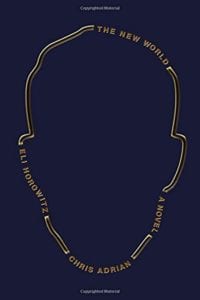
Shelf Unbound: How did you decide to write this book together, and what was your writing process?
Eli Horowitz: I had worked with Chris on his amazing novel The Children’s Hospital, and we had stayed in touch since then. The basic premise of The New World was something he had been chewing on for a while, but then we let the unusual format of the novel help determine the path of the story.
Shelf Unbound: This novel is kind of a hybrid—a sci-fi framework with existential themes, and a lot of humor as well. How did you come up with this combination?
Horowitz: This combination was at the core from the early days, but the book’s digital origins helped bring this to the foreground. We imagined it as a single path traveled three times, a story being retold and reinterpreted. This led naturally to a range of tones and styles, because we had this built-in prompt to view the central narrative from new angles.
Shelf Unbound: Over the course of the novel, you really dig into the good and bad of this couple’s marriage. What interested you in exploring a marriage?
Horowitz: I think we were particularly interested in how any relationship evolves over the course of its existence, and also beyond its existence—how you try to make sense of a relationship after the fact, a process that can feel almost like storytelling. You’re structuring a narrative, choosing what scenes to emphasize, seeking a coherent understanding—looking for a story that makes some sort of sense as you try to move forward into whatever’s next.
Shelf Unbound: The last 53 pages (in my e-book version on my phone) have the couple’s marriage vows in italic, repeated page after page and then slowly fading out. I thought this was so cool and brilliant. Where did the idea for this ending come from?
Horowitz: Because the novel originally existed in a digital format, we were on the lookout for any potential tools that might be unique to that format. In this case, the way that a digital book is unconstrained by physical limitations—for example, a definitive ending—meshed well with the concerns of the story, the tension between the past and the future and the eternal present.
Shelf Unbound: What did you particularly enjoy about writing together?
Horowitz: From my perspective, it’s just the obvious: Chris is a tremendous writer. I don’t know of anyone else with his unique perspective of imagination and ambition and craft and humor and moral urgency. He’s got a crazy set of skills, obviously—writer and doctor and chaplain—and he brings all this to bear in his fiction.
From his perspective…I respond pretty quickly to emails, maybe? I guess I’m honest without being entirely intolerable, and I try to integrate the concerns of the author and the reader, which can be useful for a writer as focused as Chris.
